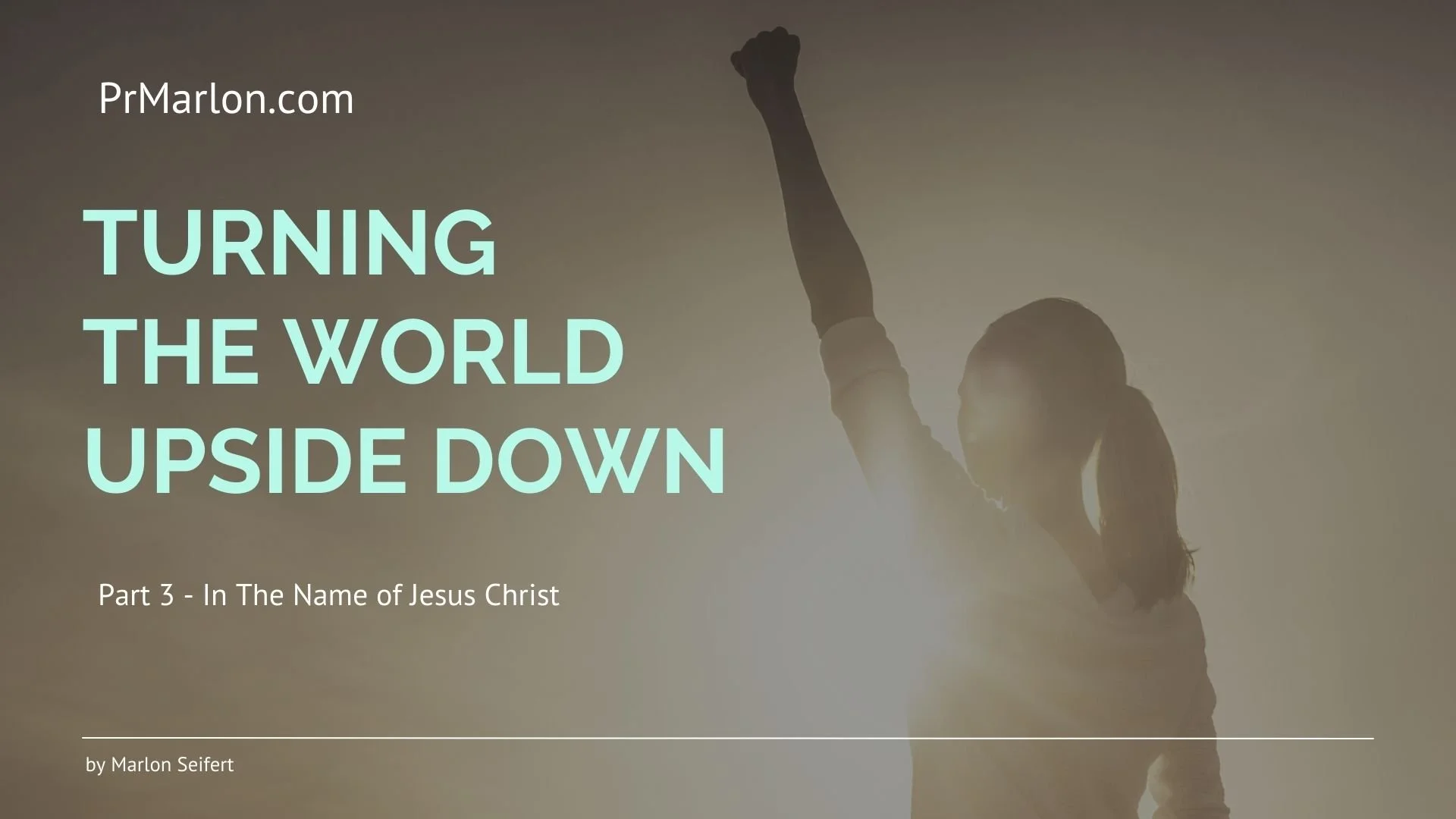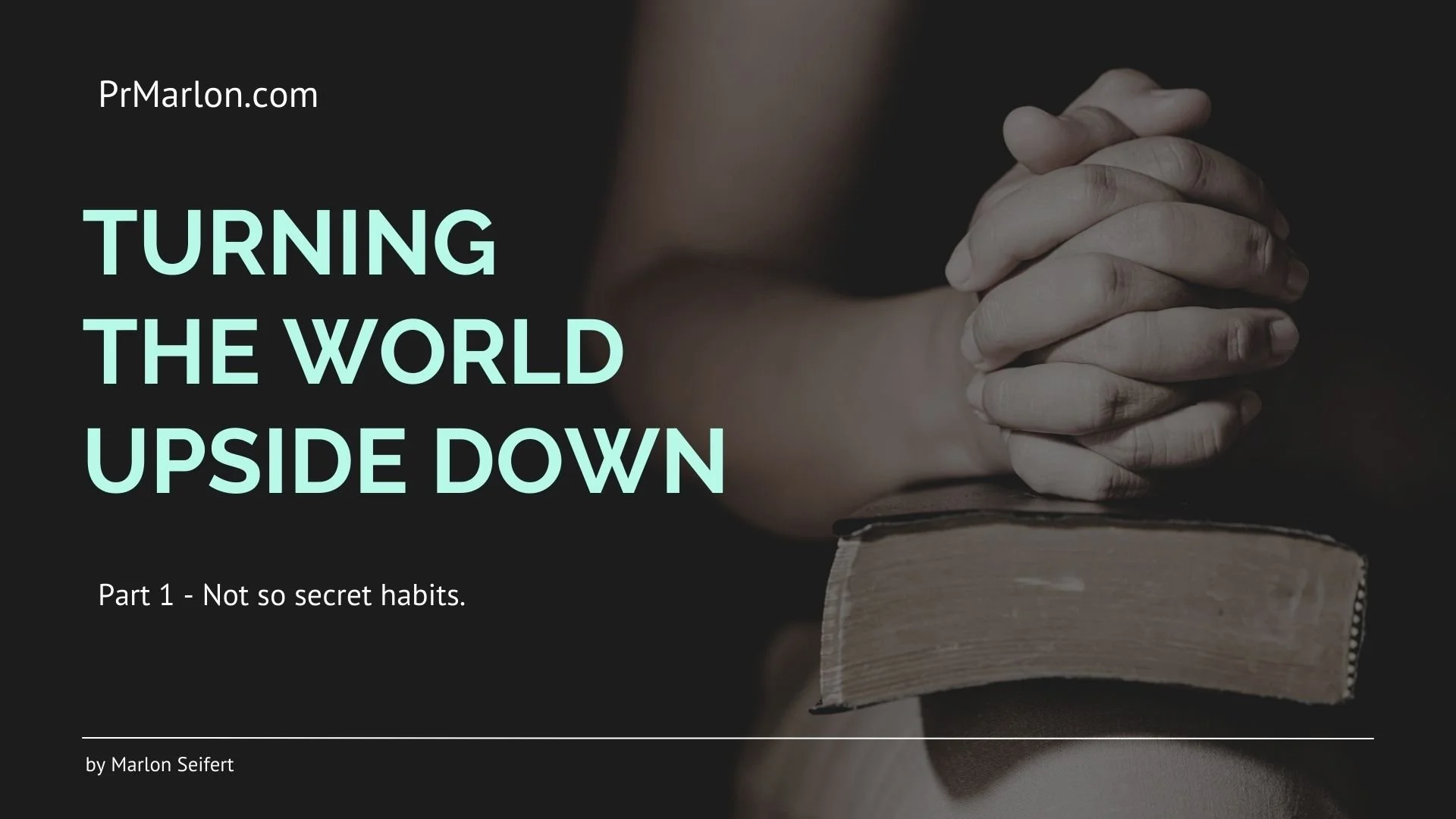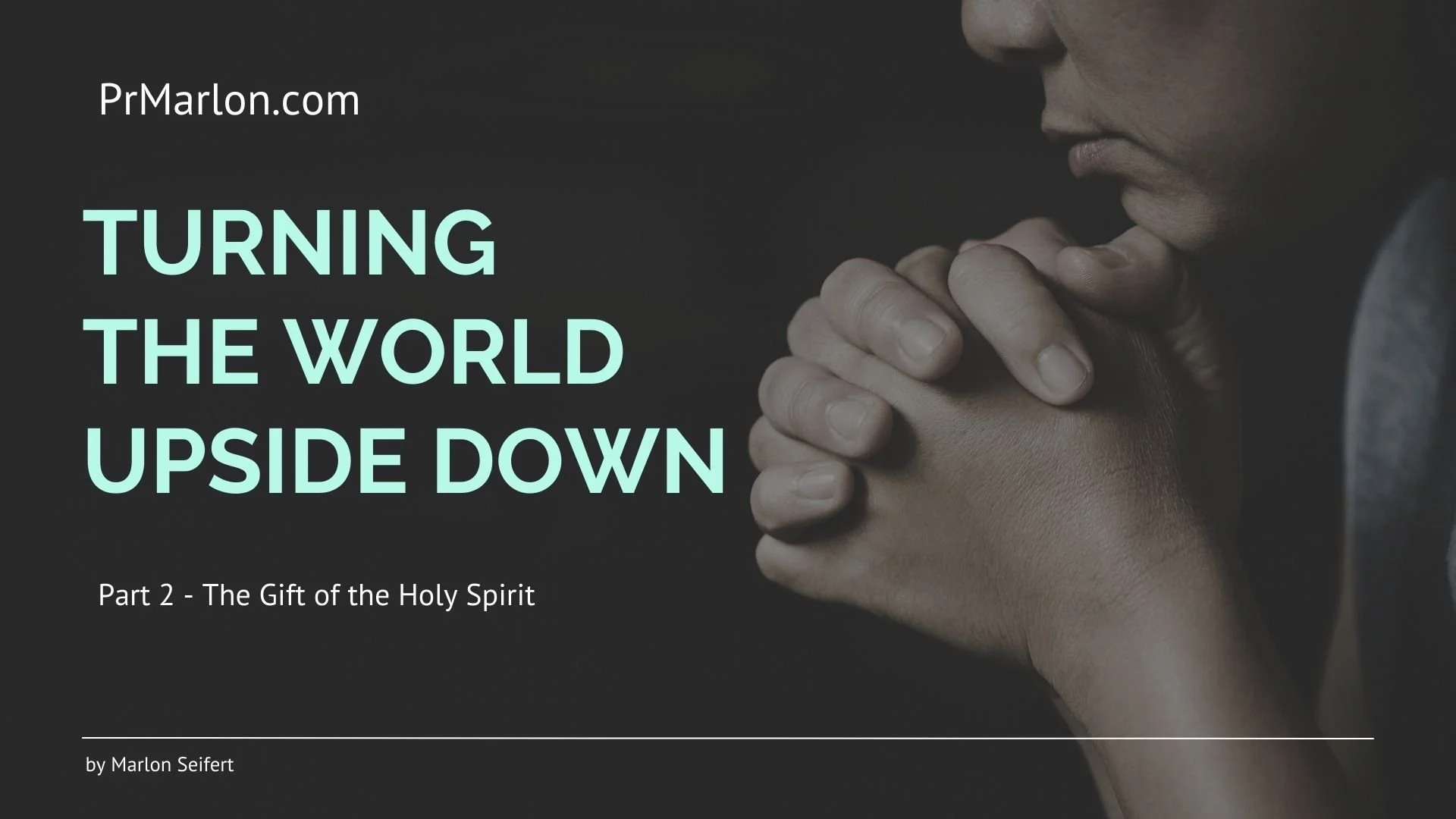In The Name of Jesus Christ
Peter and John went to pray
Peter and John went to pray. It was three in the afternoon, it was the hour of prayer. It was also the time of the evening Tamid, one of the two sacrifices held daily in the temple. The time of these daily sacrifices had become prescribed times of prayer and people would come to the temple to observe the ceremony and to pray.
(Digging deeper: Josephus recorded that the two daily sacrifices took place in the morning and at the ninth hour (Ant. 14.65; cf. Num 28:4). There also was a third time of prayer, probably at sunset. See O. Holtzmann, “Die Taglichen Gebetsstunden im Judentum und Urchristentum,” ZNW 12 (1911): 90–107. Taken from John B. Polhill, Acts, vol. 26, The New American Commentary (Nashville: Broadman & Holman Publishers, 1992)).
They met a lame man on the way
A man who had been crippled from birth was carried there to beg from those entering the temple. It makes sense that he would want to be there during this time since people would be gathering for the ceremony and prayer.
The rabbis taught that there were three pillars for the Jewish faith—the Torah, worship, and the showing of kindness, or charity. Almsgiving was one of the main ways to show kindness and was thus considered a major expression of one’s devotion to God. With their minds set on worship, those who entered the temple for the evening sacrifice and prayer would be particularly disposed to practice their piety by generously giving alms to a lame beggar.
- John B. Polhill, Acts, vol. 26, The New American Commentary (Nashville: Broadman & Holman Publishers, 1992), 126.
The exact location of the gate called Beautiful is not known. However, Josephus spoke of ten gates in the sanctuary. Nine, he said, were overlaid with silver and gold; but the tenth “was of Corinthian bronze and far exceeded in value those plated with silver and set in gold.” (Josephus, War 5.201 (cf. 5.198, 201–06; 2.411)) So massive was this gate that when it was closed each evening, it “could scarcely be moved by twenty men.” (ibid) This seems to be the same gate identified in the rabbinic literature as the Nicanor gate. (John B. Polhill, pp.126–127)
Imagine this scene with me
Day after day, for years and years this crippled man is brought to the gate of the temple to beg. “Alms, alms,” he begged thousands of times, throughout the day like a broken record, with no hopes of a different life. The most anyone did for him was to throw a few coins in his direction while trying to avoid even having to look at him, those closer to him offered to carry him to and from the gate of the temple. There the lame man sits, feeling powerless, at the mercy of those around him, hoping to make enough money for a bite to eat, with no hopes of a better life. His identity was that of a lame man, a beggar, it was the only life he knew.
I often wonder if I am in danger of claiming aspects of my fallen nature or the consequences of living in a sinful world as my identity or of seeing these characteristics as part of God’s plan for my life. It would make sense to feel this way unless the Bible reveals to me something that challenges that view, that reality, that identity. The lame man probably felt that God had made him that way and it was his lot in life to live that way. After all, there was nothing he could do about it, no one had the power to change him.
Not everyone is visibly physically crippled, but I wonder if all of us have some aspect of ourselves that causes life to be more difficult, some aspect of our physical, intellectual, or emotional self that we wish was different. Something that for some reason God has not changed or taken away. I do not understand why these things are so beyond the fact that we live in a sinful fallen world and sin has negatively impacted every aspect of life. I guess my personal struggle is to not embrace the aspects of my life that are not in line with God’s revealed will as expressed in the Bible, as part of His ultimate desire for my life. But at the same time not feel less than, or feel lost or rejected because of the struggles that I face that no one seems to have a solution to or even be able to understand. We may be facing struggles, the struggles may have been there since birth, but the struggle is a temporary part of our journey. It may very much be a reality of my life in this old sinful world, but that does not mean that it is a part of God’s perfect will for my life. As I struggle I just remind myself that God’s grace is sufficient for me (2 Corinthians 12:9).
Silver and gold have I none
Peter calls the attention of the crippled beggar and announces that he does not have silver or gold. I imagine the beggar’s heart dropping at least for a quick moment. If Peter and John do not have silver or gold, how could they help? Could this mentality be what keeps you from helping? Maybe you think to yourself, “If only I had more money, then I would help the poor, the hungry, and the needy…”
If only I had silver and gold then I would be able to make a difference in the lives of others for the better. If I had more money I could alleviate the suffering of those around me. So because we do not have silver or gold we feel like we have nothing to contribute. On that same note, those who are suffering may honestly believe that the cause of their misery is the lack of silver and gold, and if only they could have more silver and gold their suffering would cease.
Imagine Peter perhaps casting his glance up at the magnificent doors that towered above the poor beggar. They had no silver or gold either, with their beautiful craftsmanship in solid Corinthian bronze. They were too precious to be marred with an overlay that would only detract from their beauty. All the other gates of the sanctuary were gilded. Not this one. Some things are more precious than silver or gold. The beggar was soon to learn this lesson of the “Beautiful” gate. (John B. Polhill, p. 127.)
But such as I have give I thee
Just because Peter and John did not have silver or gold it did not mean that they had nothing to offer. Just because you lack silver and gold it does not disqualify you from being able to help.
What do you have?
You can only give from what you have correct?
Our connection with Jesus is crucial if we are to have anything of value to offer to those who are suffering around us. What Has God given you? Don’t focus on what you lack, what do you have?
We tend to list off what we don’t have and hope to quiet our conscience. We feel down because we do not feel like we are contributing in any meaningful way. But oftentimes, our focus on what we lack is exactly what keeps us from making meaningful contributions. Fine, you don’t have some things you wish you had, you lack some of the things many others seem to have, but what do you have? How can you contribute? How can you alleviate the suffering of those around you?
What do you have to offer? A focus on that will be much more productive than a focus on what you do not have.
In the name of Jesus Christ
In the biblical sense a name is far more than a label. It represents a person and is an extension of that person’s being and personality. To invoke the name of Jesus is to call upon his authority and power. In a real sense, then, Jesus through Peter continued his healing ministry.
- John B. Polhill, Acts, vol. 26, The New American Commentary (Nashville: Broadman & Holman Publishers, 1992), 128.
“In the name of Jesus Christ of Nazareth, rise up and walk.” (Acts 3:6b)
The power does not come from us, but from Jesus. We can only do what God calls us to do when we do it in the name of Jesus. God must empower us to do what He calls us to do. We are not able to do it on our own. It is all about God, in the name of Jesus Christ, we can diminish the suffering of those around us.
Walking and leaping and praising God
And he took him by the right hand and lifted him up, and immediately his feet and ankle bones received strength. So he, leaping up, stood and walked and entered the temple with them—walking, leaping, and praising God. And all the people saw him walking and praising God. Then they knew that it was he who sat begging alms at the Beautiful Gate of the temple; and they were filled with wonder and amazement at what had happened to him.
- Acts 3:7-10 NKJV
Before, as the lame beggar, that man sat in the court of the Gentiles at the gate to the sanctuary. Day by day he sat there at the threshold to the place of worship, but he could not enter. He was lame, blemished, and denied access to the inner courts. At this time not only had he received physical healing, but he had found spiritual acceptance as well. For the first time he was deemed worthy to enter the house of worship. This theme will repeat itself in Acts. Those who were rejected as unworthy for worship by the traditions of the religious leaders of Israel found full acceptance in the name of Jesus, whether a lame beggar, an Ethiopian eunuch, a woman, or a Gentile.
Something interesting that caught my eye was how Luke perhaps gives a veiled reference to the man’s healing being a sign of the messianic times that had come in Jesus. He used a rare word (hallomai) for the man’s jumping, a word found in the Septuagint text of Isaiah 35:6 with reference to the messianic age: “Then will the lame leap like a deer.” (John B. Polhill, p.128.)
Not my power
Now as the lame man who was healed held on to Peter and John, all the people ran together to them in the porch which is called Solomon’s, greatly amazed. So when Peter saw it, he responded to the people: “Men of Israel, why do you marvel at this? Or why look so intently at us, as though by our own power or godliness we had made this man walk?"
- Acts 3:11-12 NKJV
Peter assured the people that the cure had been wrought in the name and through the merits of Jesus of Nazareth, whom God had raised from the dead. Peter resisted the temptation of claiming the power of God as his own and leveraging God’s power for personal gain. Peter wanted all the honor and glory to be given to God.
The God of Abraham, Isaac, and Jacob, the God of our fathers, glorified His Servant Jesus, whom you delivered up and denied in the presence of Pilate, when he was determined to let Him go. But you denied the Holy One and the Just, and asked for a murderer to be granted to you, and killed the Prince of life, whom God raised from the dead, of which we are witnesses. And His name, through faith in His name, has made this man strong, whom you see and know. Yes, the faith which comes through Him has given him this perfect soundness in the presence of you all.
- Acts 3:13-16 NKJV
Repent and be converted
“Yet now, brethren, I know that you did it in ignorance, as did also your rulers. But those things which God foretold by the mouth of all His prophets, that the Christ would suffer, He has thus fulfilled. Repent therefore and be converted, that your sins may be blotted out, so that times of refreshing may come from the presence of the Lord, and that He may send Jesus Christ, who was preached to you before, whom heaven must receive until the times of restoration of all things, which God has spoken by the mouth of all His holy prophets since the world began. For Moses truly said to the fathers, ‘The Lord your God will raise up for you a Prophet like me from your brethren. Him you shall hear in all things, whatever He says to you. And it shall be that every soul who will not hear that Prophet shall be utterly destroyed from among the people.’ Yes, and all the prophets, from Samuel and those who follow, as many as have spoken, have also foretold these days. You are sons of the prophets, and of the covenant which God made with our fathers, saying to Abraham, ‘And in your seed all the families of the earth shall be blessed.’ To you first, God, having raised up His Servant Jesus, sent Him to bless you, in turning away every one of you from your iniquities.”
- Acts 3:17-26 NKJV
Practical Application/Challenge
Jesus wants to bless you and me and turn every one of us from our iniquities. The question is whether or not we will allow Him to. Repent from your rebellion, allow God to convert you, to turn you from your iniquities. Then go in the name of Jesus and bless those who God places in your path.








